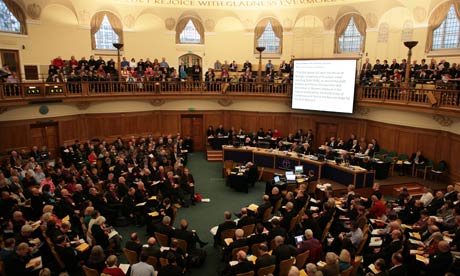Female bishops legislation must not be compromised out of existence
If the church can't accept that women and men are equally made in God's image, what's the point in having women ordained?

On Monday the House of Bishops will meet to discuss whether to try to "tweak" the delicately balanced compromise legislation to allow women to be bishops.
If they do tweak, the General Synod, which must approve the results, should reject the legislation altogether. Any further changes will make the legislation pointless, by undermining the legitimacy of having women as bishops at the same time as saying they can be. How patronising! Those opposed to women's ordination – and, worryingly, many who say they support it – seem to think that this is just about a few ambitious women wanting the pointy hat. How hopelessly, and sadly, wrong that is.
This is about the church finally and unambiguously proclaiming that women and men are both equally made in God's image and able to relate to God in the same way; that gender is not a fundamental dividing line, let alone one that necessitates a hierarchical relationship, between two fundamentally different parts of humanity.
Some people – normally those who want to slow things down – keep repeating that we haven't done the theology properly yet. That normally means that we haven't arrived at the answer they wanted.
Well, I have done the theology, and I seem to have submitted this to countless drafting groups and revision committees, so it's not exactly new. But here is why it matters.
As a body, the Church of England cannot hold two opposing views on women's ordination simultaneously. It is clear that, as individuals, we all hold our very different views on this subject in good conscience and with integrity. But that is very different from saying that official church policy is that both views are equally correct. A church cannot with integrity ordain people whom it simultaneously considers both validly and invalidly ordained.
Since women have been ordained to the priesthood for nearly 20 years, it is clear that the Church of England is a church that ordains women. Synod has repeatedly affirmed since 1975 that there is "no fundamental objection to the ordination of women", and the recent diocesan synod voting shows that the consecration of female bishops is the will of the church. It is important that the legislation to allow female bishops is not framed in such a way as to throw doubt on the legitimacy of very thing it is legislating for. Historically, when the Church of England was first established the canons and the 39 articles made it clear that the Church of England has both the legal right and the ecclesiastical power to decide who is to be ordained. It would be invidious to undermine that statement now over this issue.
Some argue that it is simply impossible for a woman to be a priest or a bishop, and so wish to avoid both our ministry and that of male priests or bishops being tainted by association. But this cannot be accepted as valid simply because it is a deeply held belief. The key theological principle at stake is summed up in the famous phrase of the early church father, Gregory Nazianzen: "the unassumed is the unhealed". Put simply, this means that we can be sure that we are saved because Jesus, in his incarnation, became human. If this is accepted, then Christ, as the fully representative human being as well as fully God, must be understood as essentially having assumed humanity, rather than maleness. In Aquinas' sacramental terminology, Christ's maleness must be essentially "accidental" (meaning incidental): the substance of the incarnation is Christ's humanity.
If the maleness of Christ is to be understood as a key salvific characteristic of the incarnation, or if gender is understood as a fundamental division within humanity, then the theological implication is that women are not included in the saving activity of the incarnation. On this understanding women, to put it bluntly, not only cannot be ordained, but cannot be saved.
The Church of England must firmly and decisively distance itself from any such suggestion, and this is why the full incorporation of women into the threefold ministry of the church is of such immense theological value. It is therefore crucial that the legislation does not compromise this fundamental understanding of gender as an essentially secondary characteristic to humanity.
The current legislation is a major compromise for all parties in this debate, and we can't find a better compromise than this. We can't compromise away the entire point of having women and men together in the threefold ministry, or the theological integrity of our church. There is no point having this legislation just to get female bishops at any price. If the House of Bishops can't bring itself to wholeheartedly endorse women's ordination, I think I will feel I have to vote against the measure at final pproval, rather than vote for enshrining theological incoherence and gender discrimination in canon law.
SOURCE: CLICK HERE to read more
Leave a comment and / or appreciate the article!
CLICK HERE to read more:» http://www.radio-elshaday.de/
CLICK HERE to read more:» http://www.radio-megapower.de/
CLICK HERE to read more:» http://christliche-radiosender.blogspot.com/
CLICK HERE to read more:» http://radiomegapower-nonstop.blogspot.de/
Posted by: Daniel Ioan Notar *DJ_DANY*
Keine Kommentare:
Kommentar veröffentlichen